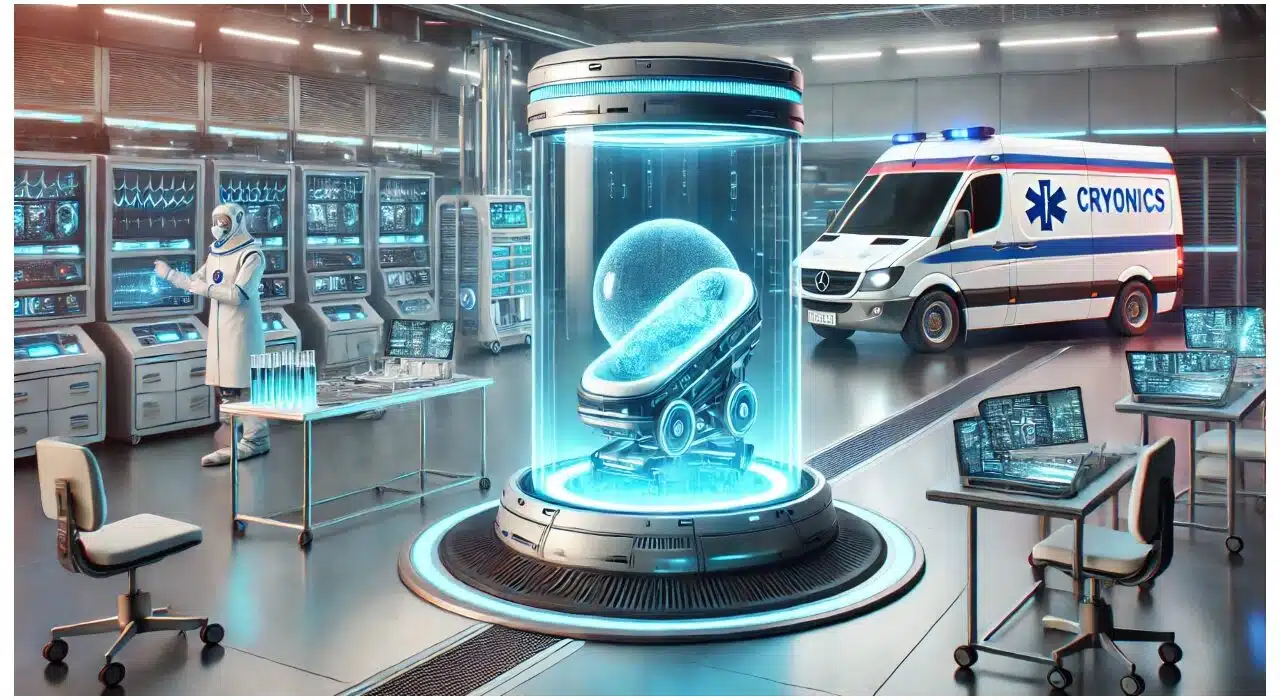Tomorrow.Bio, a German cryonic start-up, is making waves with the possibility of a second life, at the price of a luxury sports car. Cryonics, which involves preserving the body at sub-zero temperatures after death with hopes of future revival, forms the heart of this audacious proposition. For $200,000 or £165,000, individuals can choose to have their bodies cryopreserved in the hope that medical technology one day will be able to revive them.
Cryonics is very interesting but not proven yet. No human has ever been successfully revived. Tomorrow.Bio looks to alter that narrative and puts itself at the forefront of what some people view as the next frontier of humanity. Is this dream within reach or still a speculative gamble?
Cryonics: From Fiction to Aspiration
Tomorrow.Bio begins with its armada of specialized ambulances, poised to spring into action once a patient has been declared legally dead. The procedure involves rapidly cooling the body and replacing its water content with cryoprotective fluids to prevent ice crystals from forming, a process known as vitrification. The patient is then further cooled to -196°C and stored in Switzerland, where they wait for the day science may bring them back to life.
The source of inspiration for this technology is such rare cases, such as the one of Anna Bagenholm, a skier who survived revival after having been clinically dead for two hours in freezing conditions. Such stories bring hope that one day, cryonics might bridge the gap between death and revival.
Skepticism and Ethical Questions
Critics, however, remain skeptical. Experts like Clive Coen, a neuroscience professor at King’s College London, argue that the biological damage caused by death and subsequent preservation makes revival highly unlikely. Cells begin to decompose immediately after death, and reviving a body would mean overcoming extensive degradation.
Ethics also remains an issue. There are inheritance issues, future caretakers of frozen bodies, and broader social implications. Even proponents have insisted that there is no guarantee that the disease that killed him will be cured or that it may even be possible to reverse the process of cryopreservation itself.
A Movement in Ascension
Though few still question it, more people are now showing interest in cryonics. Tomorrow.Bio has already cryopreserved a few hundred individuals and animals, with around 700 people who have pre-signed up. It will also continue its operations throughout the United States by 2025. Clients are mostly less than 60 years old. The procedure can be funded using life insurance for the interested party to “travel in time.”
Proponents believe that the right to make choices about cryonics outweighs the ethical considerations. Emil Kendziorra, co-founder of Tomorrow.Bio, likens it to what was once deemed impossible and is now standard practice in medicine – organ transplants.
The Possibility of Second Life in Future With German Cryonic Start-Up
Cryonics is a small but ambitious part of the larger life-extension field, which has recently gained popularity. From anti-aging supplements to advanced medical research, the pursuit of longevity is becoming mainstream. Tomorrow.Bio aims to achieve reversible cryopreservation by 2028, a milestone that could revolutionize the field.
While the likelihood of success is still unknown, proponents regard cryonics as a leap of faith. As Kendziorra sums, “The probability of revival is higher than cremation, if nothing else.”
Cryonics thus challenges our understanding of life and death, which, in turn, comes with an endless mix of hope, science, and philosophical debate. Be it the dawn of a new era or a futuristic dream, one thing’s for sure though: the conversation around cryonics isn’t freezing anytime soon.
